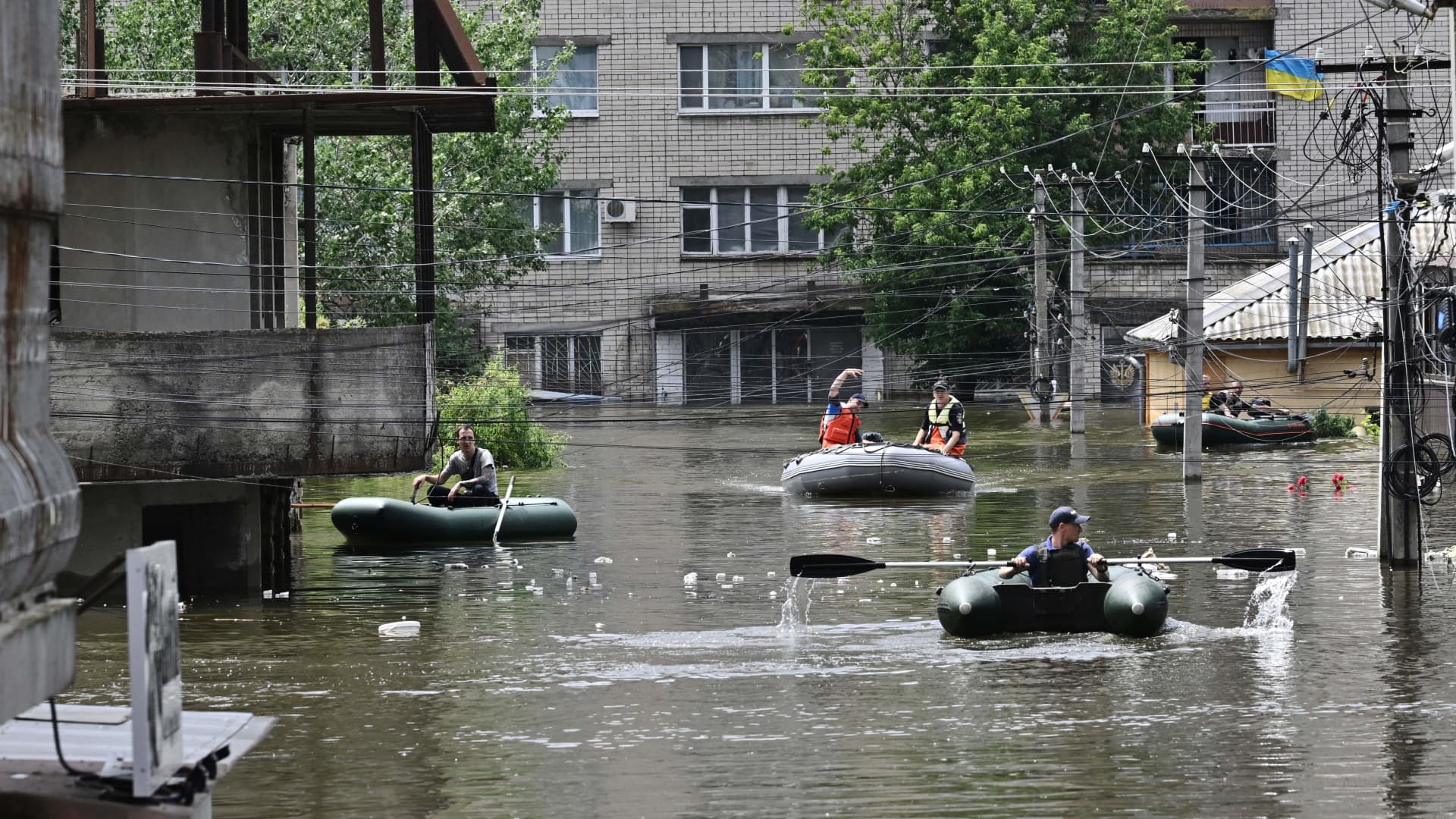A Ukrainian serviceman fires a rocket launcher during a military training exercise not far from front line in Donetsk region on June 8, 2023.
Anatolii Stepanov | Afp | Getty Images
The collapse of a strategically important dam in Russian-occupied Ukraine raises questions about the ability of Kyiv to launch a long-anticipated counteroffensive, but analysts believe the resulting carnage is unlikely to deter the next phase of the war.
The Nova Kakhovka dam, which is situated on the Dnieper River, was blown up on Tuesday. The breach has since wrought havoc for a swathe of southern Ukraine, with tens of thousands of people fleeing as entire cities were reduced to ruins by the cascading floodwater.
Ukraine accused Russian forces of blowing up the dam, while the Kremlin denied the attack and said Kyiv intentionally sabotaged the dam to distract attention from its counteroffensive. CNBC has not been able to independently verify the claims.
The dam breach comes amid months of buildup to Ukraine’s counteroffensive, a phase of the war that many see as potentially pivotal in Kyiv’s pursuit of victory.
NBC News reported Thursday that Ukraine had finally launched its counteroffensive, citing a senior officer and a soldier near the front lines. The report said a wave of Ukrainian attacks on the war’s southeastern front lines appeared to reflect a significant new push.
A spokesperson for the General Staff of the Ukrainian Armed Forces on Friday, however, dismissed reports that a counteroffensive had begun, according to Reuters. Ukraine’s government has repeatedly said there will be no public announcement of the start of the counteroffensive.
Andrius Tursa, central and Eastern Europe advisor at Teneo, a political risk consultancy, said the destruction of the Nova Kakhovka dam may alter Ukraine’s offensive plans — but was “unlikely to derail” them.
In a note published Thursday, Tursa said intensifying and offensive actions by Ukraine could indicate the start of a wider campaign, but it is likely to be “gradual and cautious.”
“Ukraine’s offensive was long expected to focus on liberating southeastern regions of the country, which could sever Russia’s ‘land bridge’ to Crimea, split the occupying forces, and pose new risks to Russian military assets in the peninsula,” Tursa said.
“While this likely remains one of the objectives, Ukraine is also under increasing political pressure to demonstrate that Western military equipment and training have enabled it to deal major blows to the Russian forces and recapture significant areas of occupied territory regardless of where it is.”
Volunteers sail on boats during an evacuation from a flooded area in Kherson on June 8, 2023, following damages sustained at Kakhovka hydroelectric power plant dam.
Genya Savilov | Afp | Getty Images
If Russia is behind the destruction of the dam, and it was approved by Russian President Vladimir Putin and military leadership, Tursa said “it shows a lack of confidence in their ability to defend the entire frontline by conventional means.”
What’s more, the dam collapse sends a message to the international community that Moscow is prepared to continue to use “asymmetric, escalatory, and highly destructive methods of defending, even if it hurts Russian interests too,” Tursa added.
Ramifications of the Nova Kakhovka dam breach
Ukraine had long warned that the Nova Kakhovka dam was a target for Russia. In November, Kyiv expressed concerns that the dam could be destroyed by retreating Russian forces from the right bank of the Dnieper River in the Kherson region.
Ian Bremmer, founder and president of political risk consultancy Eurasia Group, also said that he doesn’t expect the destruction of the dam to make much of a difference to the Ukrainian counteroffensive.
“This is not where the ‘land bridge’ [to Crimea] is most easily broken so that is probably not an impact,” Bremmer said Wednesday via Twitter, and stressed the importance of waiting for evidence as to who was behind the dam collapse.
Russian forces and occupation authorities have since sought to exacerbate the humanitarian ramifications of the flooding from Tuesday’s dam break, according to analysis from the Institute for the Study of War, a U.S.-based think tank.
This includes Russian forces hiding among civilians seeking to evacuate from flooded settlements on the east bank of the Dnieper River, according to the think tank, and reportedly shelling a flooded evacuation site in Kherson City, killing one civilian and injuring several others.
Ukrainian lawmaker Oleksiy Goncharenko, meanwhile, said the floodwaters unleashed following the dam blast would “definitely” make a counteroffensive more difficult in this area.
“We have several hundred miles of the frontlines more so there [are places] to attack but in this exact place, it will be harder. I am not a military person so I can’t use the word impossible. I don’t know but definitely much harder,” Goncharenko said Wednesday in an interview with Channel 4 News.
This story originally appeared on CNBC

